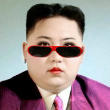jeramah
现已禁止

加入时间: 2004/05/16
文章: 2187
经验值: 53360
|
|
|
作者:jeramah 在 驴鸣镇 发贴, 来自 http://www.hjclub.org
By Ayad Allawi
On Sunday, Iraqis will go to the polls with the hope of freely electing a new government that will improve their lives and secure their country. The conduct and outcome of these elections will have huge ramifications, not just for Iraq but for the whole Middle East and indeed the entire world.
As Ryan Crocker, former U.S. ambassador to Iraq, has correctly pointed out, it is the second election that matters most in a nascent democracy such as Iraq: The process must be free and fair, and it must result in a peaceful transfer of power to the chosen representatives of the voters. To squander this opportunity would be a real tragedy for Iraq and the whole world, not to mention an insult to the memories of the thousands of Iraqi citizens who have lost their lives during Iraq's painful transition and those of the coalition troops who have helped Iraq build a democracy.
A functioning government must be able to focus on more than one thing at a time. For Iraq, that means delivering basic services, providing security, and creating an environment for economic growth and job creation. A government must also respect the will of the people and not use the powers of its office to subvert democracy and avoid meaningful competition.
Unfortunately, the current government in Iraq is undermining its fragile democracy in two ways — by abusing its incumbency to prevent free and fair elections; and through its own incompetence in these three critical areas — both of which are eroding public faith in the effectiveness of the democratic process itself.
The whole world has witnessed how some of the sectarian parties in power and their foreign patrons recently managed to hijack the political process, overturning court decisions in order to eliminate hundreds of secular and Sunni opposition candidates — despite protests from the U.S., the European Union, the United Nations and the Arab League. There is also a growing list of examples in which the government has used the security forces and state budgets to suppress dissent and bolster the parties in power.
None of this can mask the poor performance and dismal progress of the last five years, however. Most basic services in Iraq today remain woefully unavailable. Besides the humanitarian concerns it raises, this lack of access to electricity, clean water and garbage collection — to name a few — has another negative consequence: The government's inability to deliver even the most basic services erodes public confidence not only in the government itself, but also in the political system that put it in power. Iraqis are now growing increasingly skeptical of the democratic system's ability to improve their lives, and public sentiment is at a tipping point. The coming elections are perhaps the last opportunity to tip the balance in favor of a hopeful future for Iraq.
On the security front, the current government has failed to take advantage of the period of stability brought about by the U.S. troop surge and the tribal Awakening Councils. The government should have capitalized on this opportunity to achieve the necessary political reconciliation and build effective institutions — including professional military and security forces free from political cronyism and religious sectarianism — that can secure Iraq's borders and keep its citizens free from terror at home. We see the results today, with a worrying rise in bombings and sectarian killings. It is vital for the region and the world that the forces of moderation and tolerance triumph over extremism and terror.
Even the rule of law has been eroded by the politicization of the de-Baathification process under the current government. The ironically named Accountability and Justice Commission, which was supposed to correct the sectarianism of the old De-Baathification Committee, has instead used its authority to remove candidates from ballots, thus stifling political opposition and undermining the rules of democracy and law.
Iraq's high unemployment and lack of opportunities feed into the instability, which Iraq and the region can ill afford. Oil production struggles to maintain pre-invasion levels, and the economy and state budgets are still woefully dependent on this single sector. Iraq is in desperate need of a concrete plan to grow its economy and create real jobs. The people of Iraq are crying out for a non-sectarian and effective government.
This election represents a critical moment, both for Iraq and for the American people. The Iraqi people want and deserve a future where real progress is being made, and where they and their children and grandchildren can look forward to a brighter future. And the American people need to understand that this is a moment when all their efforts and sacrifices can result in a new kind of dynamic in the Middle East, or Iraq can lapse back into a sectarian political quagmire that will place renewed pressure on the U.S. to maintain a military involvement that nobody wants.
作者:jeramah 在 驴鸣镇 发贴, 来自 http://www.hjclub.org |
|
|

